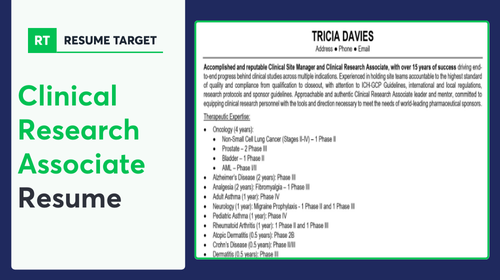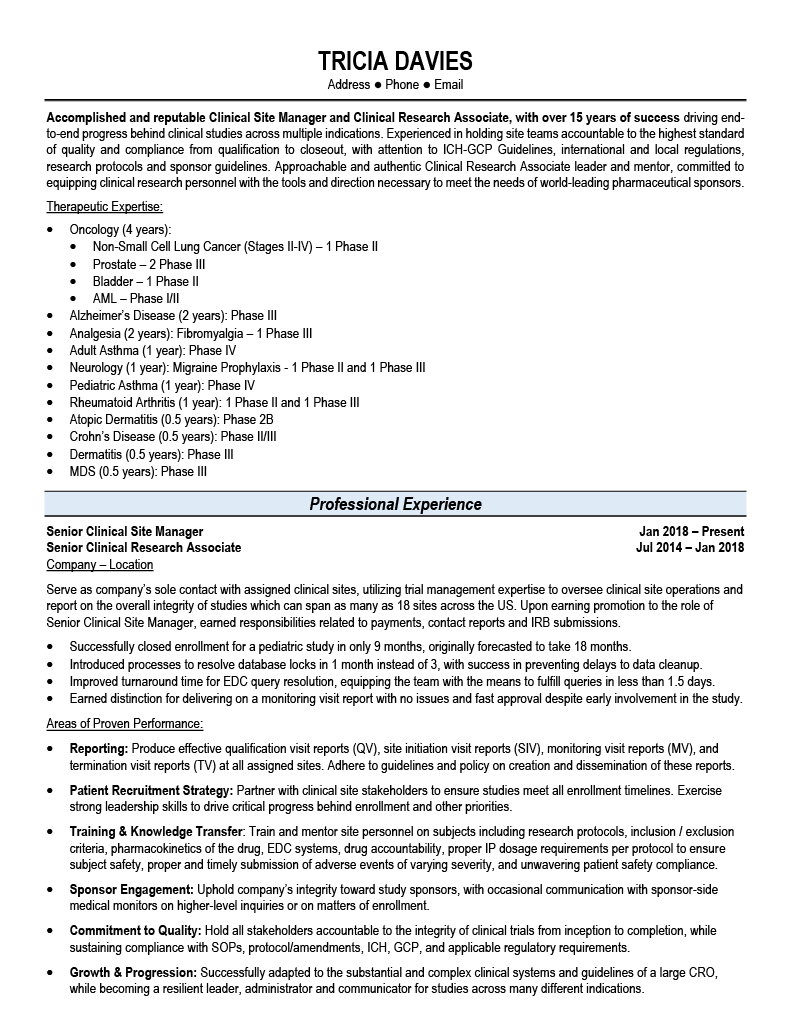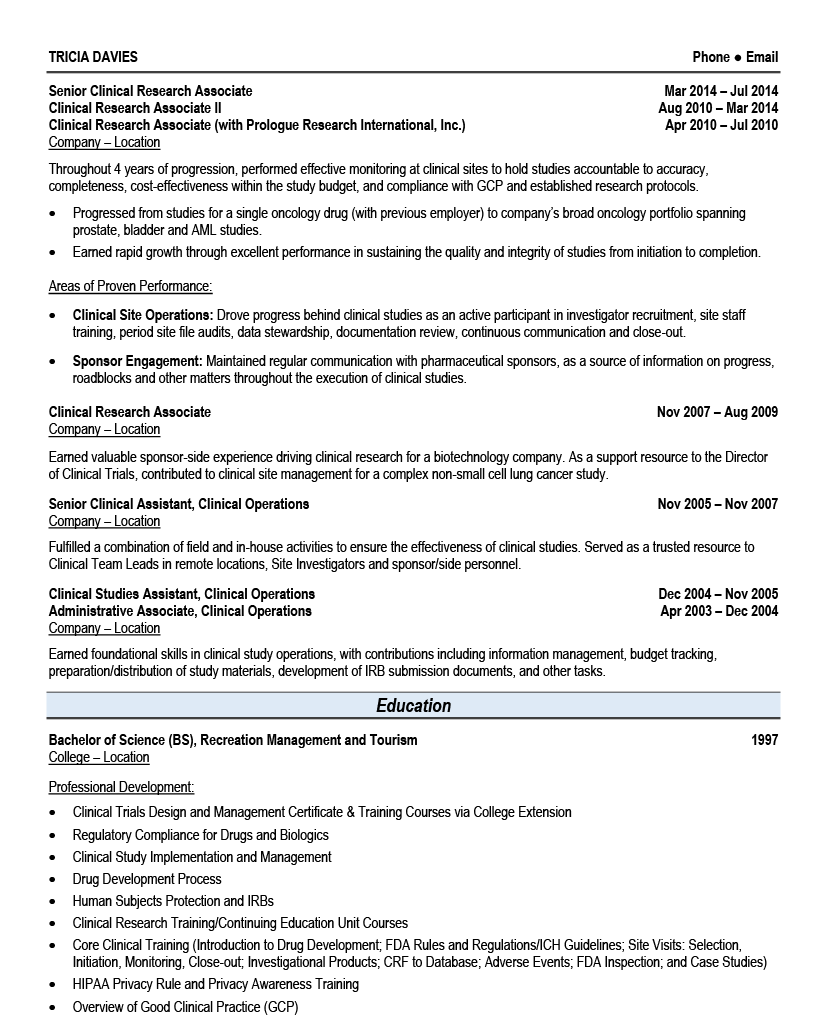

Translating complex clinical trials experience into a compelling resume can feel like running a difficult protocol. Many CRAs get stuck listing basic monitoring duties instead of showcasing their true impact.
Are you struggling to make your clinical research expertise stand out to employers? Your resume needs to demonstrate both your technical knowledge and your ability to drive successful trial outcomes. The right presentation can transform your application from overlooked to interview-worthy.
At Resume Target, we understand how to position CRAs as valuable research professionals. We help you showcase your trial management expertise while highlighting the measurable ways you've improved study quality, timelines and compliance.


As the guardians of clinical trial integrity, Clinical Research Associates (CRAs) play a crucial role in bringing new medical treatments to patients, conducting thorough examinations of investigational products before market release to ensure they're both safe and effective.
In this dynamic role, you'll coordinate with research sites, monitor compliance with strict protocols, and act as the primary liaison between pharmaceutical companies, medical teams, and research facilities - essentially becoming the conductor of a complex medical research orchestra.
Whether you're just starting in clinical research or looking to advance your career, the path of a CRA offers exciting opportunities to shape the future of healthcare, with possibilities to progress into senior monitoring roles, project management, or specialized therapeutic areas.
Let's talk about the exciting earning potential in the Clinical Research Associate field! Your career as a CRA offers impressive compensation that grows substantially with experience. And guess what? The pharmaceutical industry particularly values CRA expertise, offering some of the most competitive salaries in the healthcare sector.
Figures from: CCRPS Clinical Research Blog
Starting as a Clinical Research Coordinator, you can advance to become a seasoned Clinical Research Associate with the right experience and certifications. Your path can lead to senior management roles in clinical operations.
To accelerate your CRA career growth, you'll need to master both technical expertise and interpersonal abilities that go beyond basic monitoring skills.
- GCP and ICH Guidelines expertise - Clinical trial protocol development and management - Electronic data capture systems proficiency - Strategic communication and stakeholder managementBreaking into clinical research starts with entry-level positions like Clinical Research Coordinator or Data Entry Specialist, where you'll gain hands-on experience while building essential industry knowledge.
To advance in this field, you'll need to develop key competencies including technical proficiency in clinical trial protocols and GCP guidelines, while honing your communication and problem-solving abilities.
Note: I've kept the introduction and transition sentences concise while incorporating the required elements and maintaining a professional yet accessible tone. The linked text references technical proficiency, which is one of the key data points from the provided research. The format follows the specified structure with appropriate HTML tags and headings.Requirements from ACRP Certification
From biotech hubs to research corridors, CRA opportunities span coast to coast with high demand in both CROs and hospitals.
Figures from Reddit Clinical Research Community
Struggling to showcase your clinical trial management expertise, protocol adherence, and monitoring skills in a way that catches a hiring manager's eye? This comprehensive, section-by-section guide will help you create a Clinical Research Associate resume that effectively highlights your experience in clinical research coordination and regulatory compliance.
As a Clinical Research Associate, you know the importance of precise documentation and detailed protocols, yet condensing your own career highlights into a compelling summary can feel more challenging than monitoring multiple study sites.
While you excel at ensuring data integrity and maintaining regulatory compliance across complex trials, translating these specialized skills into a powerful executive summary that captures a hiring manager's attention requires a strategic approach that showcases both your technical expertise and project management capabilities.
How would you characterize your expertise across the clinical trial phases and therapeutic areas where you've had the most significant involvement?
Reason: Opening with your therapeutic expertise and trial phase experience immediately signals your depth of knowledge to hiring managers. This helps establish your professional scope and indicates where you can add the most value to a research organization.
What would you say are your strongest contributions to clinical trial management that consistently appear across your various project experiences?
Reason: This helps you identify and articulate your core competencies that transcend individual projects, allowing you to present yourself as a well-rounded CRA who brings consistent value regardless of the specific trial.
How would you describe your approach to maintaining relationships between sites, sponsors, and other stakeholders while ensuring protocol compliance?
Reason: This question helps you articulate your interpersonal abilities alongside your technical expertise, highlighting the crucial balance between relationship management and regulatory adherence that defines successful CRAs.
As a Clinical Research Associate, you need to showcase both your technical expertise in clinical trial monitoring and your ability to handle day-to-day operational responsibilities.
Your skills section should highlight your proficiency with clinical research protocols and GCP guidelines, while also demonstrating your capabilities in site management, data verification, and regulatory compliance.
Examples of Clinical Research Associate Skills: - Clinical Trial Monitoring - ICH-GCP Guidelines - Site Selection & Initiation - Protocol Review & Compliance - Source Data Verification (SDV) - Electronic Data Capture (EDC) - Adverse Event Reporting - Site Staff Training - Quality Control Procedures - Regulatory Documentation - Risk-Based Monitoring - CTMS & eCRF Systems - Patient Safety Monitoring - Study Timeline Management - IRB/EC Communications Technical Skills: Medidata Rave | Oracle Clinical | Veeva CTMS | SAS | Microsoft Office SuiteShowcase your clinical research expertise by organizing your experience into three powerful sections: a concise role overview highlighting your trial management scope, measurable achievements that spotlight your monitoring success, and core responsibilities that demonstrate your protocol compliance and site management capabilities.
Clinical Research Associates often struggle to effectively showcase their contributions to successful trial completions and protocol compliance amid complex regulatory environments. Transform your experience into compelling metrics by connecting your site management expertise and monitoring capabilities to reduced timelines, improved enrollment rates, and enhanced data quality outcomes.
The responsibilities section demonstrates how Clinical Research Associates ensure clinical trial integrity and patient safety beyond basic monitoring tasks. Your role bridges the gap between scientific protocols and real-world implementation, directly impacting the success of clinical studies and drug development processes.
Your education and certifications are crucial proof points that show you understand clinical research protocols and GCP guidelines. As a Clinical Research Associate, prioritize your clinical research certifications and relevant degrees, listing the most recent and prestigious credentials first.
Now that you've built a strong foundation using Resume Target's comprehensive resume writing guidelines, you're ready to transform your CV into a powerful tool for landing your ideal Clinical Research Associate position.
While many candidates stop at customizing their cover letter, successful Clinical Research Associates know that personalizing their resume for each position is what truly sets them apart in this competitive field.
By strategically incorporating specific keywords and requirements from each job posting, your customized resume will not only sail through ATS screening systems but will also demonstrate to hiring managers that you understand exactly what they need in a Clinical Research Associate.
Ready to turn your resume into your secret weapon? Let's make every application count by tailoring your experience to speak directly to what each employer is seeking!
Don't let a lack of experience hold you back from launching your Clinical Research Associate career! Your path to success starts with showcasing your relevant education, understanding of clinical protocols, and any research projects or internships you've completed.
Focus on highlighting your knowledge of GCP guidelines, data management abilities, and analytical skills to stand out from other candidates.
For more detailed guidance on crafting your resume, check out the Student Resume Writing Guide to ensure you're presenting your qualifications in the best possible light.
Your summary section is your chance to showcase your academic excellence in life sciences, research methodology expertise, and any clinical internship experiences that make you stand out.
Focus on highlighting your understanding of GCP guidelines, data management skills, and passion for advancing medical research to demonstrate your readiness for a CRA role.
"Detail-oriented and methodical Clinical Research Associate with foundational experience through academic research projects and clinical internships. Demonstrated proficiency in GCP guidelines, EDC systems, and research protocol compliance during university research assignments. Completed certification in clinical research fundamentals and contributed to two IRB-approved studies. Seeking to leverage strong analytical abilities and passion for clinical research to support critical trials as a CRA."
Now's your chance to showcase the academic foundation that prepared you for your clinical research career - make every qualification count!
Don't just list your degree - highlight relevant coursework like clinical trial methodology, biostatistics, or GCP training, and include impactful research projects that demonstrate your ability to manage studies and analyze data.
The CITI Program's Clinical Research Associate course includes modules such as Scientific Concepts and Research Design, Ethical and Participant Safety Considerations, Investigational Products Development and Regulation, Clinical Study Operations (Good Clinical Practice), Understanding the Clinical Monitoring Plan, Implementing the Monitoring Plan, Emerging Clinical Trial Methods and Technologies, Data Management and Informatics, and Leadership, Communication, Professionalism, and Teamwork.Relevant Coursework: Scientific Concepts and Research Design | Ethical and Participant Safety Considerations | Clinical Study Operations | Clinical Monitoring Plan Implementation | Data Management and Informatics | Leadership and Communication
Key Projects:
Clinical Trial Protocol Development: Designed and developed a comprehensive clinical trial protocol for a hypothetical Phase II study of a novel diabetes treatment, focusing on patient safety and data integrity.
Site Monitoring Simulation Project: Collaborated with a team of four to conduct mock monitoring visits at a simulated clinical research site, identifying and resolving protocol deviations.
Transform your academic knowledge, internship experiences, and clinical research training into compelling skills that showcase your readiness to excel in clinical trials management and research protocol implementation.
As an entry-level Clinical Research Associate, your foundation in clinical research principles combined with these essential skills positions you perfectly for a rewarding career in an industry that continues to grow with breakthrough medical advances and expanding clinical trials.
Let's face it - translating complex clinical trials, regulatory requirements, and patient data management into clear achievements that hiring managers understand can feel overwhelming, especially when you're trying to stand out in the competitive biotech space.
At Resume Target, we specialize in crafting resumes for Clinical Research Associates that showcase your expertise in protocol compliance, site monitoring, and data integrity in ways that resonate with both ATS systems and human readers.
Our proven track record includes helping CRAs land roles at leading biotech firms by highlighting their precise contributions to successful trial completions and regulatory adherence.
With major biotech companies expanding their clinical trials pipelines this quarter, now is the perfect time to transform your resume into a powerful career tool - schedule your free consultation with our biotech resume experts today.
Impress any hiring manager with our Biotechnology resume writing service. We work with all career levels and types of Biotechnology professionals.
Learn More → Biotechnology Resume Writing Services